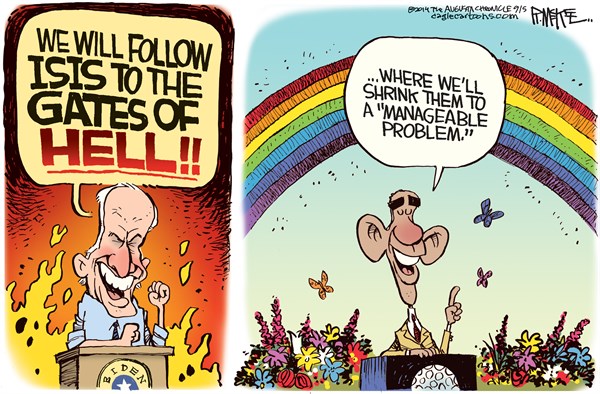
President Barack Obama's recent admission that he does not yet have a strategy to deal with the Islamic State (also known as ISIS and ISIL), which now holds significant territory in the Middle East, is the latest reminder that we are in a period of isolation — or more truthfully, one of willful blindness.
Some commentators have praised Obama for the candor of his comments. He is exercising caution, they say, as if the only alternative to being George W. Bush is being Jimmy Carter.
But most observers acknowledge the reality that editors of The Economist so aptly articulated months before the president's unfortunate phrasing hit the airwaves: "When America's president speaks of due caution, the world hears reluctance — especially when it comes to the most basic issue for any superpower, its willingness to fight."
And without a president's leadership, how does a nation know what to fight for?
Obama's reluctance to project U.S. power does not come as a surprise, nor is it a disappointment to many. Americans elected him not in spite of this tendency but because of it.
Only a year ago, the Pew Research Center found that nearly half of Americans wanted the United States to "mind its own business internationally," suggesting that even the shrinking role of the U.S. in international affairs was too much.
But on account of recent and disturbing events perpetrated by a terrorist organization that is "as sophisticated and well-funded as any group that we have seen," according to Secretary of Defense Chuck Hagel — and one hell-bent on killing Americans and Europeans among others — the public has become understandably worried that a laissez-faire policy is as dangerous as a heavy-handed one.
Pew's latest study shows that more than half of Americans think Obama's approach in foreign policy is not tough enough, a sentiment undoubtedly reinforced by his clumsy, if wholly sincere comments last week.
Through the brutal killings of women and children in Iraq and Syria and the barbaric beheadings of U.S. journalists at the hands of a masked militant, Americans are only beginning to learn the breadth of the threat they face from the Islamic State.
But the administration, and the president in particular, has long known the nature of the threat that this organized army of terrorists poses to the U.S. and its allies.
Reports that Obama was given "granular" details and specific intelligence about the rise of the Islamic State for at least a year before the group descended upon Mosul make not only his inaction at the time but also his failure to clearly articulate and pursue a strategy now all the more alarming.
The refrain that people are war-weary has been a frequent media trope, but it has also become somewhat of an excuse for inaction.
To borrow a phrase from columnist Peggy Noonan, Americans are "more like war-leery, or war-wary, which a great nation should be, especially after two wars, both bungled in their execution and their ending."
But for those Americans who served, whether as civilians or in uniform — me and my husband included — the squandered opportunity to build on the success of the surge in Iraq, and the willful neglect of the threat emerging across the Syrian border, are a betrayal of their sacrifice. Even limited but strategic and sustained efforts years ago — when the available options to intervene were many — could have deterred the Islamic State's rise to power.
Instead, we find ourselves in a situation where the only palatable option may be to wait for our enemy's next deadly move. Hence our absent strategy.
The U.S. has long been entangled in a perilous and perennial cycle of total engagement followed by total abandonment of the most volatile and dangerous region in the world — which did not start with this president or even his predecessor. But it has become Obama's cross to bear.
His eventual strategy must marry a robust diplomatic and military offensive against the Islamic State, including better arming our allies on the ground, congressional authorization to use force and leading the rest of the world — from the front this time — in the effort to destroy and not merely contain the threat.
Unless his plan does all these things, the Islamic State will be his successor's cross to bear as well.
Comment by clicking here.
Cynthia M. Allen is a columnist for the Fort Worth Star-Telegram.
Previously:
• 09/08/14 Is social media enlarging or stifling democracy?


 Contact The Editor
Contact The Editor
 Articles By This Author
Articles By This Author
